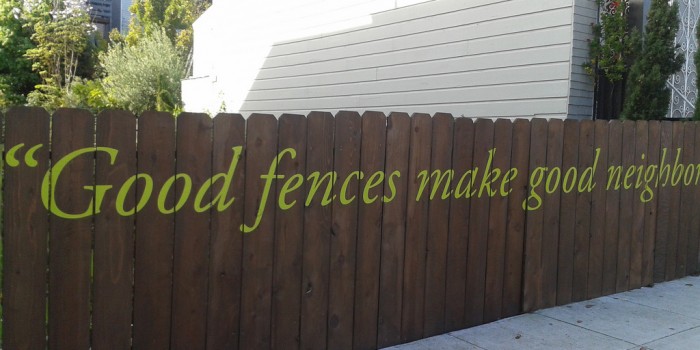Posted on December 22, 2016 by Kristi Manley, LMHC, LCPC
Marriage & Relationships

Share
Other Blog Topics
Many people wonder about what the American poet Robert Frost meant in his poem: Mending Wall, when he repeats the old proverb: “Good fences make good neighbors.” In the context of the poem, two neighbors get together once a year to “walk the fence” that divides their property for the purpose of mending whatever parts need repair. One neighbor does not understand the importance of performing this ritual each year and furthermore, wonders why the wall is even necessary. All the while, the other neighbor simply answers his query with “good fences make good neighbors.” In my counseling practice, I like to explain it this way: Relationships are important to everyone. They are the primary way we get our material and emotional needs met. To have relationships that are healthy, however, requires that, while we get our needs met, it is important to know where the “lines are”.
To be more specific, boundaries are the physical, psychological and emotional dividing line between “me” and “you.” Boundaries that are “safe” promote 1) a healthy sense of control over one’s own life, 2) mental and spiritual health, 3) a knowledge of self, 4) self-mastery (a feeling of competence that one can take care of oneself), and 5) satisfying and respectful relationships.
Ineffective or harmful boundaries: 1) cut us off from knowing our true self, 2) make us subject to faulty beliefs about the real world, 3) create confusion and “emotional reasoning,” (i.e. ‘I feel bad, therefore I must BE bad.’) and 4) make it difficult for us to act on our own behalf or advocate for ourselves.
Unhealthy boundaries may be characterized by the following:

Emotional dependency or co-dependency are terms which are also commonly used, but misunderstood in our society today. They occur when external sources such as another person or relationship become the focus of self-esteem rather than one’s own intrinsic worth as a human being or in one’s own achievements. Because of this dynamic, emotional dependency leads to clingy, needy behaviors where partners lose themselves in each other. Eventually, hostility and helplessness can set in, leading to traumatic divisions and break-ups.
Healthy boundaries can be learned and strengthened in therapy. To embark on a new and unfamiliar way of interacting with others can be daunting, but very satisfying when one sees cooperation, mutual respect and inter-dependence begin to grow between oneself and loved ones.
Kristi Manley, LMHC, LCPC – Quad Cities
(563) 359-0696 or [email protected]
More posts about Marriage & Relationships